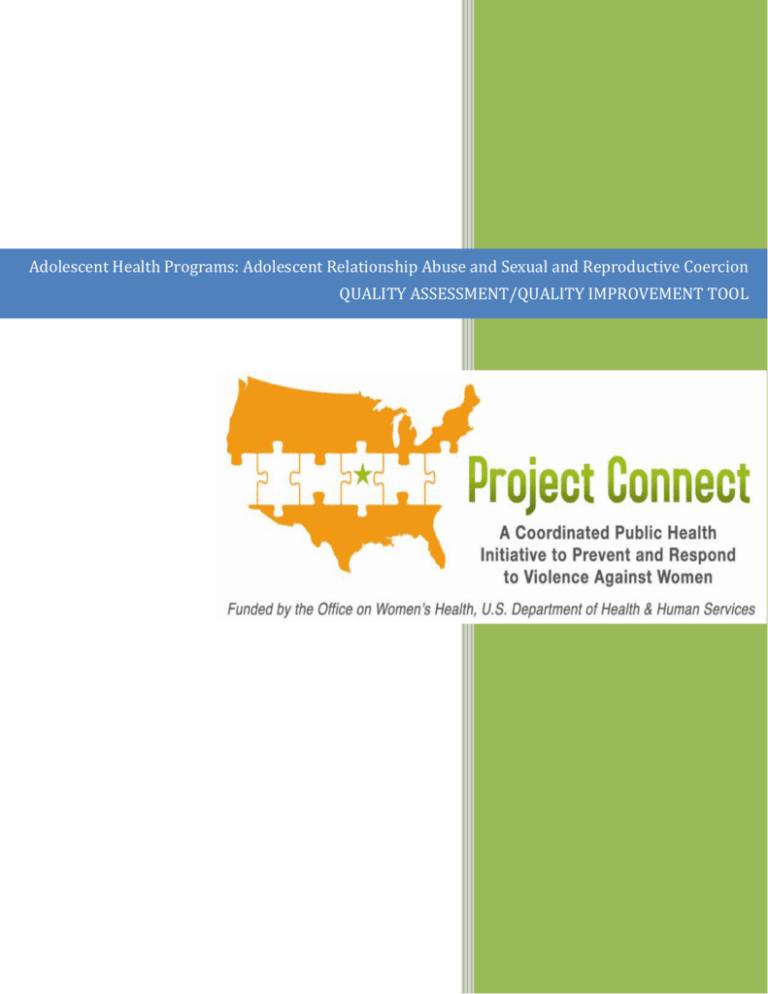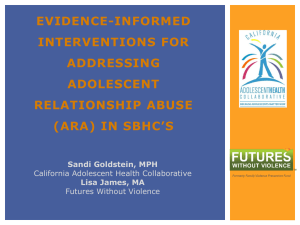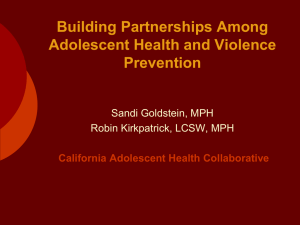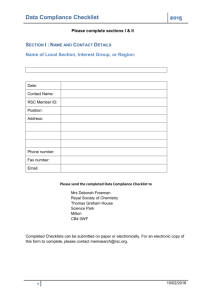
Adolescent Health Programs: Adolescent Relationship Abuse and Sexual and Reproductive Coercion
QUALITY ASSESSMENT/QUALITY IMPROVEMENT TOOL
Adolescent Health Programs
The following quality assessment tool is intended to provide adolescent health program/practice
managers with some guiding questions to assess quality of care related to promotion of healthy
relationships and intervention related to adolescent relationship abuse (ARA) and reproductive and sexual
coercion (RSC) within their programs/practices. The information is to be used as a benchmark for each
practice to engage in quality improvement efforts.
This tool was created as part of Project Connect’s efforts to improve services to adolescents for the
prevention and intervention around ARA and RSC, and to optimize healthy relationship development. This
tool will help provide guidance on how to enhance your practice to respond to adolescent relationship
abuse and reproductive and sexual coercion.
Completed by:
Program/Clinic Name:
Date:
Protocols
Yes
No
N/A
Don't Know
Yes
No
N/A
Don't Know
Does your program/practice provide universal
education and anticipatory guidance on healthy
relationships?
Does your practice/program have a written
protocol for assessment and response to:
Adolescent relationship abuse (ARA)
Reproductive and sexual coercion
Does your program/practice provide direct
assessment for reproductive and sexual coercion
(RSC) during:
Birth control counseling
STI/HIV visits
Emergency contraception visits
Pregnancy tests
Does your program/practice provide direct
assessment for adolescent relationship abuse
(ARA) during:
a visit addressing alcohol or other drug use
a visit addressing depression or suicidality
Does your program provide patients with a written
explanation of confidentiality and limits of
confidentiality when they check-in?
PC 2.0
Adolescent Health QA/QI Tool
Page 1
Are there any scripts or sample questions that
providers can use to:
Inform patients about confidentiality and
mandated reporting requirements
Ask patients about adolescent relationship abuse
Ask patients about reproductive and sexual
coercion
Yes
No
N/A
Don't Know
No
N/A
Don't Know
Are there specific prompts on the intake form (or
in the electronic record) to encourage providers to
assess for ARA and RSC?
Is there a private place in your clinic to screen and
talk with patients?
Does your clinic have a policy to ensure that
providers ask ARA and RSC when the patient is
alone (i.e. no friends, parents, etc. present)?
Assessment Methods
Yes
How are patients assessed for adolescent
relationship abuse (ARA) and reproductive and
sexual coercion (RSC)?
Assessment occurs in a private place
Patients answer questions about ARA and RSC on
a medical/health history form (paper or
electronic)
Staff use safety card to assess and educate
Staff review the medical/ health history form
and ask additional follow-up questions
Which staff members are primarily responsible for assessing patients ARA and RSC? (please pick one)
Counselor
Medical Assistant
NP/RN
MD
Other (Please explain) ___________________________
How often are patients asked about ARA and/or RSC?
With each new sexual partner
At least every six months
At least once a year
No established time interval
During specific visit type (please list) ________________________
PC 2.0
Adolescent Health QA/QI Tool
Page 2
Yes
No
N/A
Don't Know
No
N/A
Don't Know
No
N/A
Don't Know
Are there tools (e.g. cards, scripts, and/or
prompts) to help your staff:
Explain to patients why they are being asked
about ARA and RSC
Inform patients about confidentiality and any
mandated reporting requirements
Educate patients about impact of ARA and RSC
on health
Documentation of Assessment and Response
Yes
On the medical/health history/assessment
form(s) are following steps documented:
Hanging Out or Hooking Up and/or Did You Know
Your Relationship Affects Your Health? safety
card was offered and discussed
Harm reduction strategies were shared
Referral to DV/SA program provided
Intervention Strategies
Yes
Does your staff:
Have instructions on how to file a mandated
report when needed
Know an on-call advocate or counselor who can
provide follow-up with patients who
disclose ARA or RSC
Have a safe place where the patient can use a
phone at your clinic/program to talk to a violence
advocate/shelter/support services
Know how to highlight the national hotlines on the
card with a patient who discloses abuse
Does your program have resource lists that:
Identify referrals/resources (shelters, legal
advocacy, housing, etc.) for patients who disclose
ARA or RSC
Identify referrals to agencies that have adolescent
specific services
Identify referrals to agencies that provide culturally
or linguistically specific services
Includes a contact person for each referral agency
Does your program have a staff person who is
responsible for updating the resource list? If so,
who? (please identify by title; no names)
_____________________________________
Is your resource list updated at least once a year?
PC 2.0
Adolescent Health QA/QI Tool
Page 3
Networking and Training
Yes
No
N/A
Don't Know
Within the last year, has your staff had contact with
representatives from any of the following agencies
(contact means: called to refer a patient, called for
assistance with a patient, called for information
about program):
Domestic violence/sexual assault agency or shelter
Rape crisis center
Child protective services
Legal advocacy/legal services
Law enforcement
Is there anyone on your staff who is especially skilled/comfortable dealing with ARA and RSC issues that other staff
can turn to for help?
Yes (please identify staff by title) _____________________________________
No
Does anyone on your staff participate in a local adolescent relationship abuse task force or related subcommittee?
Yes (please identify staff and describe task force/subcommittee) __________________________________
No
Is there a buddy system or internal referral for staff to turn to for assistance when they are overwhelmed or
uncomfortable addressing violence or coercion with a patient?
Yes (please describe)________________________________ _____________________________________
No
Yes
No
N/A
Don't Know
Do new hires receive training on assessment and
intervention for ARA and RSC during orientation?
Does your staff receive booster training on
assessment and intervention for ARA and RSC at least
once a year?
Within the last 2 years, have representatives from
any of the following agencies conducted a training
for your staff:
Domestic violence/sexual assault agency or shelter
Rape crisis center
Child protective services
Legal advocacy/legal services
Law enforcement
PC 2.0
Adolescent Health QA/QI Tool
Page 4
Self-Care and Support
Yes
No
N/A
Don't Know
Does your program:
Have a protocol for what to do if a staff person is
experiencing intimate partner violence or
reproductive and sexual coercion
Have a protocol for what to do if a perpetrator is
on-site and displaying threatening behavior or
trying to get information
Give staff the opportunity to meet and
discuss challenges and successes with cases
involving ARA or RSC
Have an employee assistance program (EAP) that
staff can access for help with current or past
victimization
Do your protocols advise staff on what to do if they do not feel comfortable or adequately skilled to help a patient
when ARA or RSC is disclosed? (e.g. Can staff ‘opt out’ if they are survivors of or currently dealing with personal
trauma?)
Yes (please describe)________________________________ _____________________________________
No
Environment and Resources
Yes
No
N/A
Don't Know
Does your program have:
Posters/cards/posters about ARA and RSC
displayed
Posters/cards/posters about healthy and unhealthy
relationships displayed
Information specific to LGBTQ relationship violence
Have these brochures/cards/posters been placed in
an easily visible location?
Have these brochures/cards/posters been reviewed
by underserved communities for inclusivity, linguistic
and cultural relevance?
Has your program adapted any materials to make them more culturally relevant for your patient population?
Yes (please describe)________________________________ _____________________________________
No
Who is responsible for stocking and ordering materials including reproductive and adolescent health cards,
pregnancy wheels and posters? (please identify staff by title) _____________________________________
PC 2.0
Adolescent Health QA/QI Tool
Page 5
Data and Evaluation
Yes
No
N/A
Don't Know
No
N/A
Don't Know
Does your program:
Does your program record the rate of documented
screening for ARA and RSC?
Record the rate of documented disclosures of ARA
or RSC by patients?
Conduct an annual review and update of all
protocols addressing violence and coercion?
Do any consumer satisfaction surveys or focus
groups asking patients’ opinions about assessment
and intervention strategies for ARA/RSC?
Provide regular (at least annual) feedback to
providers about their performance regarding ARA
and RSC assessment?
Education and Prevention
Yes
Does your program provide information to patients
on how unhealthy relationships and violence can
impact their health?
Does any of the information that you provide to
patients address healthy relationships?
Does your program sponsor any patient or
community education events to talk about healthy
relationships and indicators of abuse?
Additional Comments and Observations
PC 2.0
Adolescent Health QA/QI Tool
Page 6





